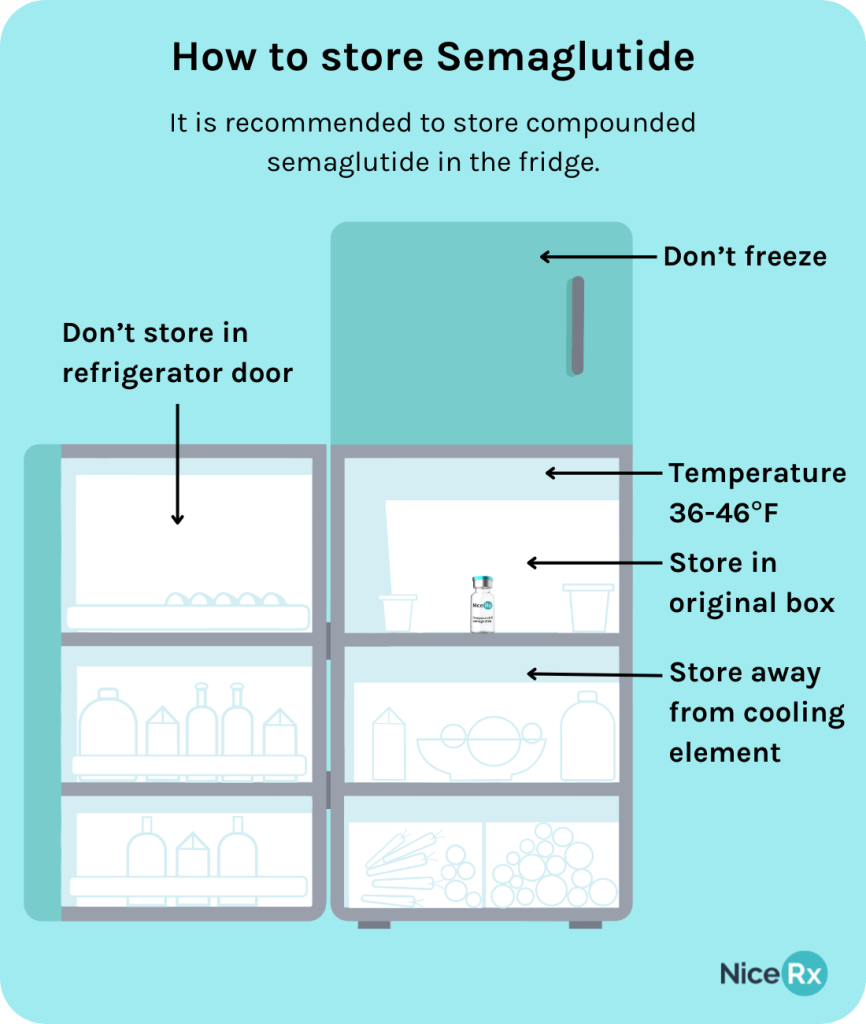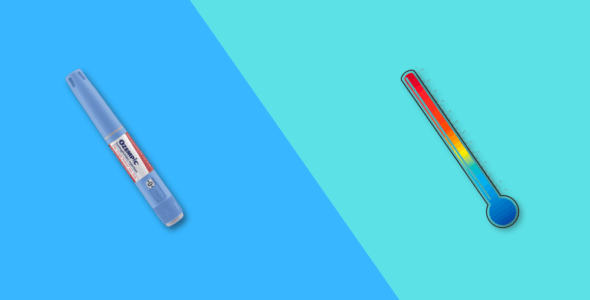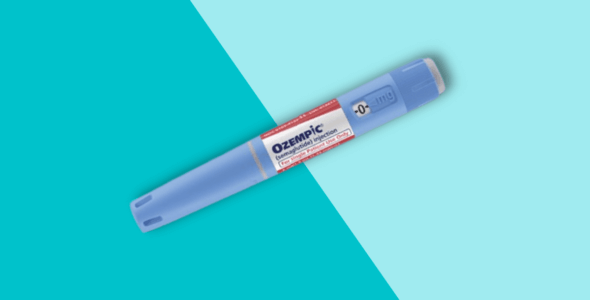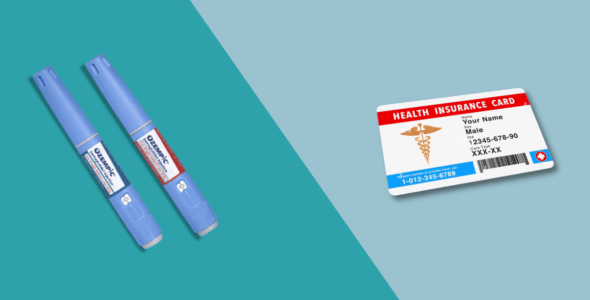Does compounded semaglutide need to be refrigerated? Storage and traveling tips for semaglutide
Compounded semaglutide is a customized version of the GLP-1 (glucagon-like peptide-1) medication semaglutide, made by compounding pharmacies to suit individual needs. it contains the same active ingredient as Wegovy, Ozempic and Rybelsus. It is used to help with weight loss in people with obesity or overweight and control blood sugar levels in people with type 2 diabetes by mimicking a natural hormone that regulates hunger and insulin.
Proper storage of compounded semaglutide in the refrigerator between 36°F to 46°F (2°C to 8°C) is important to ensure the medication remains effective and safe to use. Keeping it at the right temperature and away from light helps preserve its potency and prevents it from breaking down.
It is important to take your semaglutide injections on the same day each week and follow a regular schedule. Be sure to rotate injection sites to avoid using the same spot each time to avoid injection site reactions. Keep reading below to learn more about how to store compounded semaglutide and tips on how to travel with the medication.
Does semaglutide need to be refrigerated?
Yes, unused and unopened semaglutide vials should be stored between 36°F and 46°F (2°C to 8°C), so it is important to put them in the refrigerator right away to keep them at the right temperature and protect them from extreme heat or sunlight.
Once the vial is used or opened when you first use it, you should continue refrigerating them after use. Do not freeze the vials or pens, and if they have been frozen, do not use them.
Both brand name and compounded semaglutide should be refrigerated when unused. Brand name Ozempic can be kept at room temperature for up to 56 days.

How long does compounded semaglutide last in the fridge?
The recommended fridge duration for compounded semaglutide depends on the beyond-use date (BUD) of the product and differs by compounding pharmacy.
However, in most cases, compounded semaglutide can last in the fridge for up to 30 days. After that, it may not be effective or safe to use.
It is important to check the expiration date and shelf life of your semaglutide. Throw away any expired or unused medication as directed by your healthcare provider or pharmacist.
Proper storage and following the storage requirement guidelines help keep the medication safe and effective. Using expired medication can be less effective and may even be harmful.
Why does compounded semaglutide need to be refrigerated?
Compounded semaglutide is sensitive to extreme temperatures, which can cause it to lose its effectiveness. If it is exposed to too much heat or cold, its chemical structure can break down, making it less potent.
Improper storage can make semaglutide less effective, leading to ineffective blood sugar control and the possible need for adjustments in your treatment. It can also waste money and increase the risk of spoilage or bacterial growth in the medication, posing health risks.
Refrigeration helps preserve the structure and potency of compounded semaglutide by keeping it at a stable temperature. This prevents the medication from breaking down and losing its effectiveness.
Can semaglutide be frozen?
No, semaglutide should not be frozen. Freezing can damage the medication and reduce its effectiveness. It should always be stored in the fridge, but never in the freezer. If semaglutide is frozen or thawed out, do not use it and throw it away.
Does semaglutide expire?
Yes, semaglutide expires and the expiration depends on the beyond use date (BUD) and differs by compounding pharmacy. The expiration and beyond use date (BUD) will be listed on the vial and it should not be used after that date. Using expired semaglutide may reduce its effectiveness and could be unsafe.
Storage tips for compounded semaglutide
Always follow your healthcare provider’s instructions for storage to maintain the effectiveness of compounded semaglutide.
Here are a few tips for maintaining optimal storage conditions:
- Store compounded semaglutide in the refrigerator at temperatures between 36°F to 46°F or 2°C to 8°C).
- Store semaglutide in the main part of the fridge. Keep it away from the freezer and the cooling element.
- Keep the semaglutide pen or vial upright to prevent leakage.
- Keep it away from higher temperatures and direct sunlight.
- Keep it out of reach of children and pets.
- Avoid placing it near heat sources or in damp areas.
Always check compounded semaglutide for any discoloration or changes before use.
Traveling with semaglutide by plane
When traveling by plane with semaglutide, keep unopened vials in your carry-on luggage to avoid temperature changes in checked luggage.
Make sure it stays at the right temperature, either in a cooler or refrigerated bag and follow any airline rules for carrying medication. Always bring your prescription or doctor’s note if needed.
Traveling with semaglutide by car
When traveling by car with semaglutide, keep it in a cool, temperature-controlled bag or with ice packs, or cooler to avoid excessive heat or cold.
Ensure it stays at the right temperature and avoid leaving it in the car for long periods, or storing in the trunk, especially in hot or cold weather. However, even while traveling, you should place your semaglutide in a refrigerator the moment you have access to one.
If you are unsure about its storage during your trip, ask your healthcare provider or pharmacist for advice.
Frequently asked questions about semaglutide storage
What happens if semaglutide is not refrigerated?
If compounded semaglutide is left out of the fridge, it could lose its potency and is potentially unsafe to use. Additionally, temperature fluctuations can reduce its effectiveness, making it less effective at controlling blood sugar or aiding in weight loss. It may also increase the risk of infection or side effects.
Semaglutide should be stored at the recommended temperature to keep it stable and effective. Proper storage in the fridge helps prevent contamination and bacteria, ensuring the medication works as intended.
Always check for signs that semaglutide may no longer be effective including changes in its appearance, such as discoloration or cloudiness. If you notice any of these changes, consult your healthcare provider before using it.
What should I do if I accidentally leave semaglutide unrefrigerated?
If you accidentally leave semaglutide unrefrigerated, check how long it was at room temperature. If it is more than a few hours, contact your healthcare provider or pharmacist for advice. They may recommend discarding it or replacing it.
How can I tell if my semaglutide has gone bad?
You can tell if semaglutide has gone bad if it looks discolored, cloudy, or has visible particles, which means it is no longer safe to use.
If it has been stored improperly or past the expiration date, it may also not work as well. If you are unsure, it is best to consult your healthcare provider for medical advice.
Bottom line
Semaglutide is an injectable medication that helps control blood sugar and aids in weight management.
Refrigeration in the recommended temperature range (2°C to 8°C) is essential for compounded semaglutide to maintain its effectiveness and stability.
Following proper storage guidelines is crucial to keep your medication effective, prevent degradation, and contamination, and avoid any health risks.
Always follow storage instructions and consult your healthcare professional or pharmacist if you are unsure about how to store your semaglutide.









